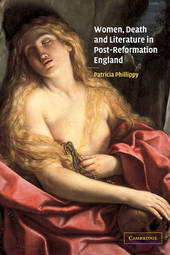
|
Women, Death and Literature in Post-Reformation England
Paperback / softback
Main Details
| Title |
Women, Death and Literature in Post-Reformation England
|
| Authors and Contributors |
By (author) Patricia Phillippy
|
| Physical Properties |
| Format:Paperback / softback | | Pages:324 | | Dimensions(mm): Height 229,Width 152 |
|
| Category/Genre | Literary studies - c 1500 to c 1800
British and Irish History |
|---|
| ISBN/Barcode |
9780521126182
|
| Classifications | Dewey:820.93548 |
|---|
| Audience | | Professional & Vocational | |
|---|
| Illustrations |
Worked examples or Exercises
|
|
Publishing Details |
| Publisher |
Cambridge University Press
|
| Imprint |
Cambridge University Press
|
| Publication Date |
14 January 2010 |
| Publication Country |
United Kingdom
|
Description
In Women, Death and Literature in Post-Reformation England Patricia Phillippy examines the crucial literal and figurative roles played by women in death and mourning during the early modern period. By examining early modern funerary, liturgical and lamentational practices, as well as diaries, poems and plays, she illustrates the consistent gendering of rival styles of grief in post-Reformation England. Phillippy emphasises the period's textual and cultural constructions of male and female subjects as predicated upon gendered approaches to death. She argues that while feminine grief is condemned as immoderately emotional by male reformers, the same characteristic that opens women's mourning to censure enable its use as a means of empowering women's speech. Phillippy calls on a wide range of published and archival material that date from the Reformation to well into the seventeenth century, providing a study that will appeal to cultural as well as literary historians.
Author Biography
Patricia Phillippy is Associate Professor of English at Texas A&M University. She is the author of Love's Remedies: Recantation and Renaissance Lyric Poetry (1995).
Reviews"Phillippy illuminates the complexity of interacting forces contributing both to the development of gendered norms and to the opportunities they could provide to early modern women. This is a thoughtful, creative study...Phillippy is impressive in her historicist approach to her chosen texts...Her book's value...also lies in its eclecticism. It will surely stimulate future scholarship following different trajectories. This complex, careful, and wide-ranging work will appeal to a broad, if advanced audience, while also serving as a corrective to more simplistic explorations of the relationship between gendered norms, historical context, and cultural expression." Megan L. Hickerson, King's College, London, Canadian Journal of History "Patricia Phillippy's study is recommended for its breadth, its conceptual clarity, and its engagement with complex and subtle aspects of cultural history, gender studies, and, more marginally, biography." Biography "Impeccably researched and impressively detailed [...] Phillippy makes a rewarding contribution to intellectual history." Studies in English Literature "In discussing her thesis of women's empwerment, the author combines fascinating pieces of history involving embalming, tomb sculpture, and inheritance with the literature of consolation and mourning.... Phillippy offers good comments on texts by Ameilia Lanyer and Rachel Speght, and on many other topics; her book will repay the attention of scholars of Elizabethan and Stuart literature and culture." Choice "This learned and stimulating book has much to offer both literary critics and cultural historians of early modern England." Renaissance Quarterly "...wide-ranging and perceptive...The book is a stimulating and original contribution to a fast-growing field in need of the kinds of directions laid out so clearly and elegantly here...Women, Death and Literature is clearly written, well researched, and beautifully produced - it is a pleasure to use. Patricia Phillippy has written a very good book indeed, one to which early modern scholars will be indebted for many years to come." Albion "[Phillippy] excavates valuable and wide-ranging documents on women's involvement in death and dying, and carefully distinguishes between women's self-representations and other cultural constructions. Moreover, she maintains a carefully nuanced understanding of public and private roles often oversimplified in studies of early modern women's lives and works....Phillippy offers a valuable model for historicizing affect and provides an important service for literary critics and historians of the early modern period through her extensive archival research." H-WOMEN
|